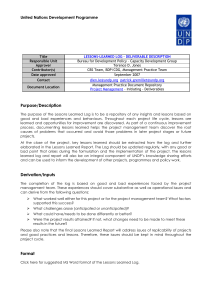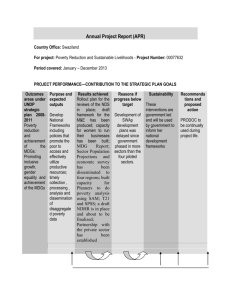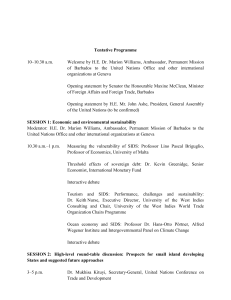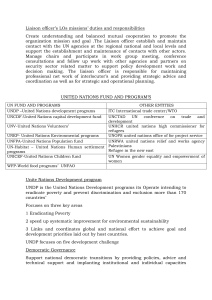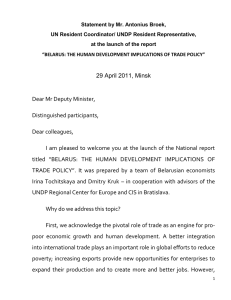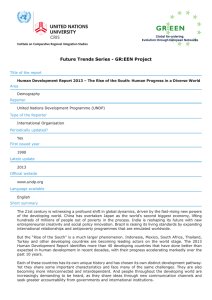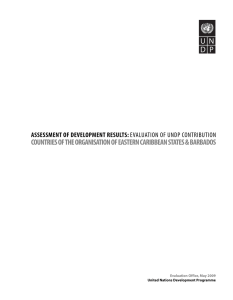Developing an Implementation Strategy for a System of Environmental-Economic Accounting
advertisement
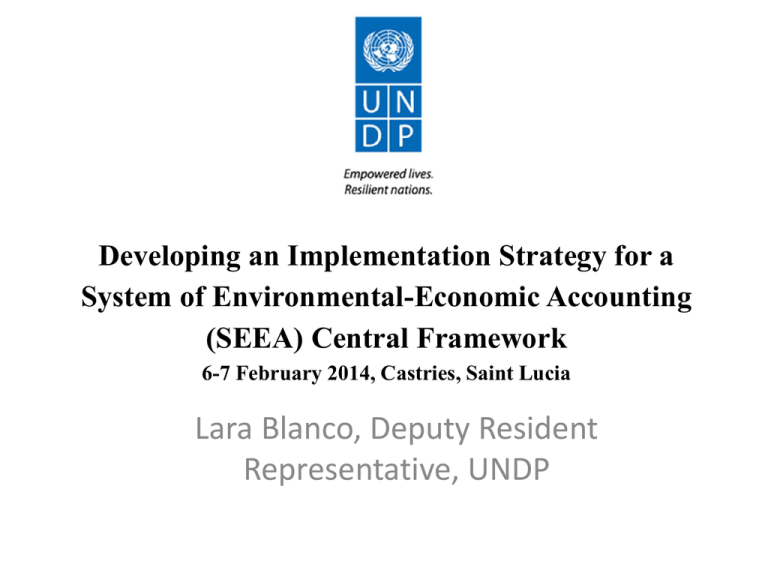
Developing an Implementation Strategy for a System of Environmental-Economic Accounting (SEEA) Central Framework 6-7 February 2014, Castries, Saint Lucia Lara Blanco, Deputy Resident Representative, UNDP Barbados, the OECS, 3 OTs Hard core vulnerability Natural hazards and climate change Small size and openness Changing demographic patterns Increasing levels of unemployment and underemployment Dependence on fossil fuels Ongoing loss of experienced skilled professionals to larger countries Rising food prices and growing dependence on food imports to meet domestic needs Limited progress in developing and deploying science and technology to address common development challenges Loss of social cohesion and rising criminal activity and drug use UNDP in the Eastern Caribbean Programme structured around a set of priorities: 1. Improved governance and regulation of environmental and energy issues taking account of the 2012 Barbados Declaration and post Rio+20 policy and programme priorities; 2. Evidence-based inclusive governance and citizen security policy and programme development; 3. Harmonisation of social, environmental and economic data collection and increased use of evidence-based policy and decision-making processes at the subregional and national level; 4. Improved social protection services and systems to reduce poverty and inequity, with increased economic participation and social inclusion projects that target vulnerable populations. UNDP in the Eastern Caribbean Reaffirmation of SIDS specific, frameworks -Post 2015 consultations Grenada and St. Lucia -7 SIDS 2014 National consultations -Regional/Inter Regional Preparatory Meetings for SIDS 2014 Economic, environmental, social dimensions MDGs 8 Goals, 18 targets and 48 indicators Already an integrated framework, from which we can identify lessons, challenges going forward. Political, technical, institutional fragmentation. The World We Want Post 2015 A Comprehensive, Integrative and Sustainable Approach to Development Propositions • Sustainable development is not possible without comprehensive data collection on both social and environmental factors • A ‘Data Revolution’ is required to secure a Human rights based development approach in Barbados and the OECS for example multi-dimensional approaches to measuring poverty, and social inequality and recognition that GDP is not an adequate measure of development Confronting environmental challenges Cost of inaction: potential environmental impact on poverty 3 examples 1. Assessing and Addressing Loss and Damage Resulting from Slow Onset Events Associated with Climate Change in Small Island Developing States (SIDS) Ways to assess and address loss and damage from climate change How loss and damage is assessed has direct implications for how loss and damage is addressed. Develop regional expertise and sources of information to help SIDS address loss and damage. Creation and collection of a list of data needs as well as the level of data required to implement a robust assessment. 3 examples 2. Adoption of a Multi-dimensional Approach to Poverty • Develop a policy framework to ensure the MPM approach is widely adopted and applied • Develop a permanent, sustainable sub-regional mechanism to support the MPM approach and the periodic measurement of the MPI • Invest in the mainstreaming of an understanding of multidimensional poverty in public opinion debates, policy and programme design 3 examples -Use UNDP/Oxford model -3 dimensions -Include dimensions -income/employment (under LS) -Make decisions about the indicators St. Lucia, Grenada, Dominica, St. Kitts, Barbados MPI Employment/Income Environmental vulnerability 3 examples 3. UNDP/UNISDR/WB GFDRR initiative to develop Loss Accounting databases to support enhanced risk management in public sector. -Strengthening of national databases on hazard impacts; -Development of inputs to inform specifics of DRR strategies; -Incorporation of DRR into national public investment and development. Among other strategic priorities Support to structural transformation of productive capacities through: • Policies, systems and measures in place to support jobs and livelihood investments in sustainable development • Inclusive and sustainable social protection • Natural systems management on national and subnational levels • Increased energy efficiency • Scaling up of interventions for disaster risk reduction and climate change mitigation and adaption UNDPs Energy Programming for Sustainable Development • Balancing production and consumption • Developing renewable energy sources • Improving accountability of energy service providers with a focus on the State • Participatory decision making • Monitoring the impact of energy policies at national, regional and global levels UNDP Initiatives which SEEA can support • The UNDP-UNEP Poverty-Environment Initiative (PEI) • Green, Low-Emission and Climate-Resilient Development Strategies and related green economy work Relevance of SEEA to UNDPs Work • Will provide information for evidence based decision making • Will compliment the HDI and family of indexes • Will compliment the MPI and will serve to expand UNDPs range of data collection tools to address key areas of development If development is our business, data is our raw material
